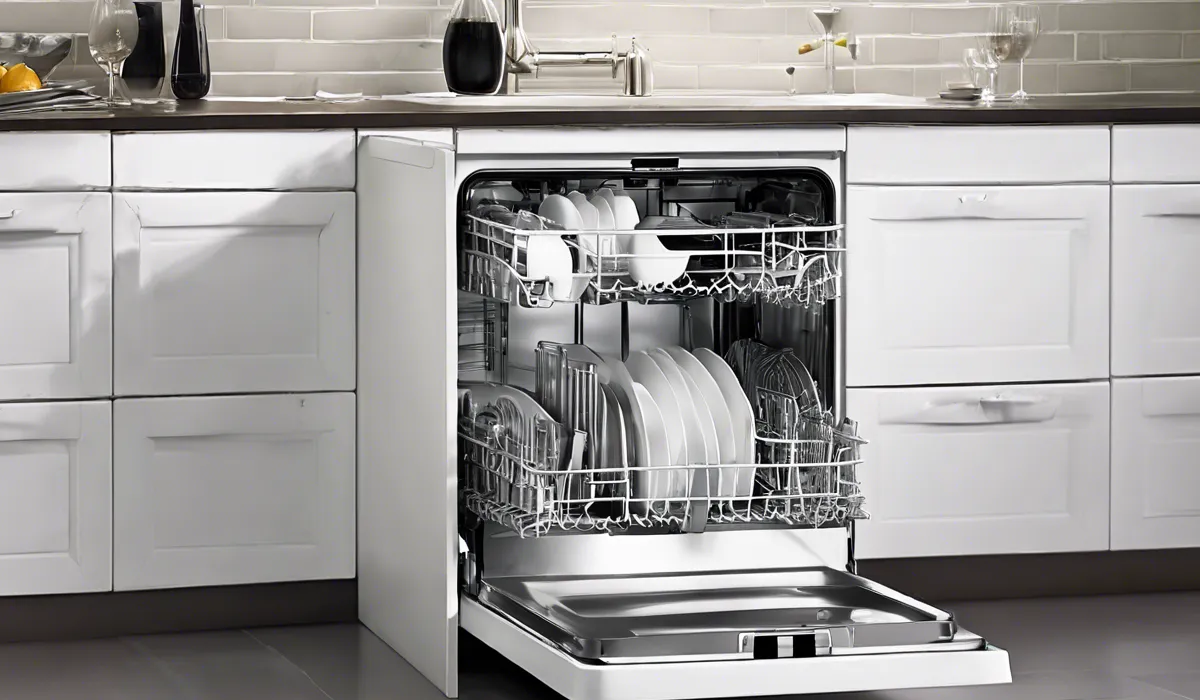Why is My Dishwasher Leaving White Residue? Solve It Now!
Your dishwasher may leave white residue due to hard water minerals, insufficient rinse aid, or detergent overload. Ensure you use the correct detergent amount and consider a water softener if you have hard water.
Causes of White Residue

Hard Water Mineral Deposits
One common culprit behind the unsightly white residue in your dishwasher is hard water. This type of water contains high levels of minerals like calcium and magnesium that can deposit on dishes during the wash cycle.
The minerals cling to surfaces as water evaporates, leaving a chalky white film behind. Over time, these deposits can also accumulate within the dishwasher’s inner workings, potentially affecting its performance.
Inadequate Rinsing Due to Overloading
Overloading your dishwasher can prevent it from rinsing dishes properly. When there isn’t enough space between items, water and detergent cannot circulate effectively, leading to residue buildup.
It’s essential to leave sufficient room between dishes and to place them in the dishwasher according to manufacturer recommendations to ensure thorough cleaning and rinsing.
Insufficient Water Temperature
Water temperature plays a vital role in dissolving detergent and effectively cleaning your dishes. If the water isn’t hot enough, the detergent may not dissolve completely, leaving a residue.
Most dishwashers require a minimum temperature of 120°F to operate effectively. Ensuring that your home’s water heater is set to the correct temperature can help mitigate this issue.
Poor Quality or Wrong Type of Detergent
The type and quality of detergent you use can significantly impact the cleanliness of your dishes. Some detergents may not be compatible with your dishwasher model or the type of water in your home.
Using a detergent that is specifically designed for dishwashers and checking for any recommended brands or types in your dishwasher’s manual can make a difference.
Rinsing Agent Issues
A rinsing agent helps water flow off dish surfaces more smoothly, preventing spots and residue.
If your dishwasher is not properly utilizing a rinsing agent or if the agent has run out, this can result in white residue. Regularly check and refill the rinsing agent dispenser to maintain optimal performance.
Troubleshooting and Prevention

Checking and Cleaning the Dishwasher Filter
A clogged dishwasher filter can hamper water flow and cleaning efficiency, leading to residue on dishes.
Check your dishwasher’s filter regularly and clean it according to the instructions in your user manual. This simple maintenance task can prevent white residue and extend the life of your appliance.
Adjusting the Amount of Detergent Used
Using too much detergent is a common mistake that can cause residue. Check the recommended detergent amount for your dishwasher and the hardness level of your water.
Adjusting the detergent dosage accordingly can prevent white film from forming on your dishes.
Using a Dishwasher Salt or Water Softener
If you have hard water, a dishwasher salt or water softener can be a game-changer.
These products work by softening the water, thus preventing mineral deposits from forming on your dishes. Follow the manufacturer’s instructions for adding salt or softener to your dishwasher.
Ensuring Proper Loading Techniques
Proper loading is key to preventing white residue. Make sure not to block the spray arms and to place items so that the water can reach every surface. Check your dishwasher’s manual for specific loading guidelines to optimize cleaning and rinsing.
Running the Dishwasher at the Correct Temperature
Verify that your dishwasher is set to the correct temperature for the detergent and rinse aid you are using. Some models have a built-in heater to ensure the water reaches the ideal temperature for dissolving detergents and eliminating residue.
Adding a Rinsing Aid or White Vinegar
If you’re not already using a rinsing aid, consider adding it to your routine. For a natural alternative, white vinegar can also help to remove white residue.
Fill the rinse aid dispenser with white vinegar, or place a cup of vinegar on the top rack during the wash cycle as a DIY solution.
Maintenance and Regular Cleaning

Regularly Cleaning Spray Arms and Nozzles
For your dishwasher to function at its best, the spray arms and nozzles must be free of any blockages. Regularly inspect and clean these parts to ensure water can flow freely, reaching all the dishes and preventing residue.
Descaling Dishwasher with Specialized Cleaners
Descaling your dishwasher is essential, especially if you have hard water. Use specialized descaling cleaners to remove mineral buildup within the machine.
This not only helps in preventing white residue but also maintains the efficiency of your dishwasher.
Monthly Maintenance Routines
Implementing a monthly maintenance routine for your dishwasher can prolong its lifespan and ensure it cleans effectively. This routine should include cleaning filters, checking for debris, and running a cleaning cycle with a dishwasher cleaner.
Inspecting and Replacing Worn Parts
Worn or damaged parts can impair your dishwasher’s performance. Inspect components such as the spray arms, seals, and racks regularly. If you notice wear and tear, consider replacing these parts to maintain optimal functionality.
Professional Maintenance Recommendations
If you’ve conducted all the above steps and still experience issues, it may be time to seek professional help. A qualified technician can provide maintenance recommendations and service your dishwasher to ensure it operates at its best.
FAQs About Dishwasher White Residue
Why is my dishwasher leaving a white residue on dishes?
The white residue on dishes from your dishwasher can be caused by hard water minerals, insufficient rinse aid, or using too much detergent.
Can hard water cause white residue in my dishwasher?
Yes, hard water contains minerals that can leave a white residue on dishes after a wash cycle.
How does rinse aid affect white residue in dishwashers?
Rinse aid helps prevent white residue by improving drying and reducing water spots, which can occur if there’s not enough used during the wash cycle.
Is detergent amount related to white residue on my dishes?
Yes, using too much detergent can lead to a buildup that appears as a white residue on dishes.
Should I consider a water softener to prevent dishwasher white residue?
If you have hard water, a water softener can be beneficial in preventing the buildup of minerals that cause white residue.
Final Thoughts
To tackle the issue of white residue in your dishwasher, address hard water minerals with a water softener, use the correct detergent amount, and ensure adequate rinse aid is applied.
These steps will help prevent the white film from depositing on your dishes, ensuring they come out clean and spotless after each wash.





